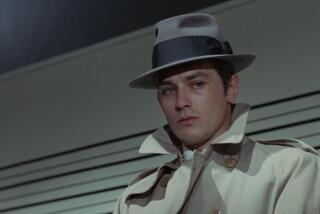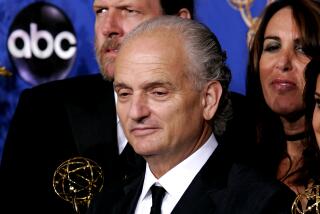James Gandolfini dies: Why men had a love affair with Tony Soprano
After the news broke that actor James Gandolfini had died, media outlets everywhere scrambled to put him, and his beloved character Tony Soprano, into cultural context. But if you wanted to understand the importance of the man and the show, all you had to do was listen to sports radio.
Even as the NBA Finals moved toward a thrilling and decisive Game 7, ESPN sportscasters were talking about nothing but Gandolfini’s death, reminiscing about “The Sopranos” with the tones of sorrowful obsession usually reserved for the passing of an iconic coach or star athlete.
It was the same on Thursday, one day after the death of the 51-year-old actor. On radio, television and the Internet, men you wouldn’t consider terribly invested in entertainment or celebrity culture were still wide-eyed and clearly wounded.
PHOTOS: James Gandolfini | 1961-2013
“The Sopranos” is regularly touted as the show that begat the creative shift that lifted television over every other narrative art form including film. It did this in many ways, but perhaps the most significant is the simplest: Gandolfini’s Tony Soprano made it possible for men to obsess about a TV show and not feel like a geek.
Obviously men have always watched TV, enthusiastically and, in the case of shows such as “The Tonight Show,” “All in the Family” and “Hill Street Blues,” religiously. But there was never a show that sparked in them the same emotional investment that many women felt for their favorite open-ended, character-driven dramas. Real Men didn’t watch soaps.
Until “The Sopranos.”
“The Sopranos” was an hour-long homage to the peril and prestige of Old World masculinity. Sometimes a cigar is just a cigar, but balanced between Tony’s fingers it was just the final grace note in a narrative so rich in symbolism it could, and would, be deconstructed as thoroughly as any Shakespearean play or Greek tragedy.
All the naked women writhing on stripper poles probably didn’t hurt either.
PHOTOS: Gandolfini’s career highlights
Although it aired on Sunday night, no one considered it an opportunity to lean back in the Barcalounger with a beer and possibly doze off in preparation for the work week ahead. Every Sunday was suddenly the Super Bowl, and men rushed into each other’s office on Monday to discuss the plot twists and imagery of each episode with the eagerness of “Sex and the City” fans exchanging romantic confidences.
Many people, including most recently Brett Martin in his book “Difficult Men: Behind the Scenes of a Creative Revolution: From the Sopranos and the Wire to Mad Men and Breaking Bad,” point to the fifth episode of the first season — in which Tony takes his daughter on a college tour as the day television changed. In the episode, Tony kills an informant he accidentally discovers living under witness protection and that is when many men of my acquaintance pledged their devotion to Gandolfini.
The bittersweet college tour is something with which most parents can identify, as is the desire to see in a child’s eyes, if not adoration, then a belief in the best version of the truth about themselves. The gimmick of “The Sopranos” was sending a mobster into therapy, but through David Chase’s writing and Gandolfini’s performance, Tony became Everyman in extremis — wanting the right things but pursuing them the wrong way.
OBITUARY: James Gandolfini swaggered his way to fame
Tony was fat. Tony was in therapy. Tony had issues with his wife and his mother, but he did what he had to do for himself and his family, which is still the essential algorithm for manhood.
That “what he had to do” was murder someone, quickly, secretly and with his bare hands while still remaining sympathetic was simply intoxicating. Soon men were swapping insights and opinions with bar stool camaraderie.
“The Sopranos” made serialized storytelling manly. Suddenly it was cool for even those men who deplored the metrosexualization of everything to follow a TV show avidly, raptly, and in communion with other men.
These conversations occurred at every socio-economic level, granting fandom an unheard of credibility and creating a template for the engaged and devoted fan base every show, large and small, now seeks to win. “The Sopranos” canonized the antihero, but it also created the superfan — the same men who adored Tony would go on to fall for “Deadwood’s” Al Swearengen, “Mad Men’s” Don Draper and “Breaking Bad’s” Walter White.
But no love is as powerful as the first love. The “Sopranos” male audience can still rattle off favorite scenes and lines like batting averages, still attack and defend certain characters with the same range of emotions they bring to discussions about Kobe Bryant or Ray Lewis.
To many, “The Sopranos” wasn’t so much a show as a team, a great and glorious unprecedented team that rode to victory year after year after year.
And James Gandolfini was its captain.
MORE ON HIS LIFE AND DEATH:
PHOTOS: Celebrities react on Twitter
OBITUARY: James Gandolfini swaggered his way to fame
REACTION: Stars heartbroken by news of Gandolfini’s death
More to Read
The complete guide to home viewing
Get Screen Gab for everything about the TV shows and streaming movies everyone’s talking about.
You may occasionally receive promotional content from the Los Angeles Times.







